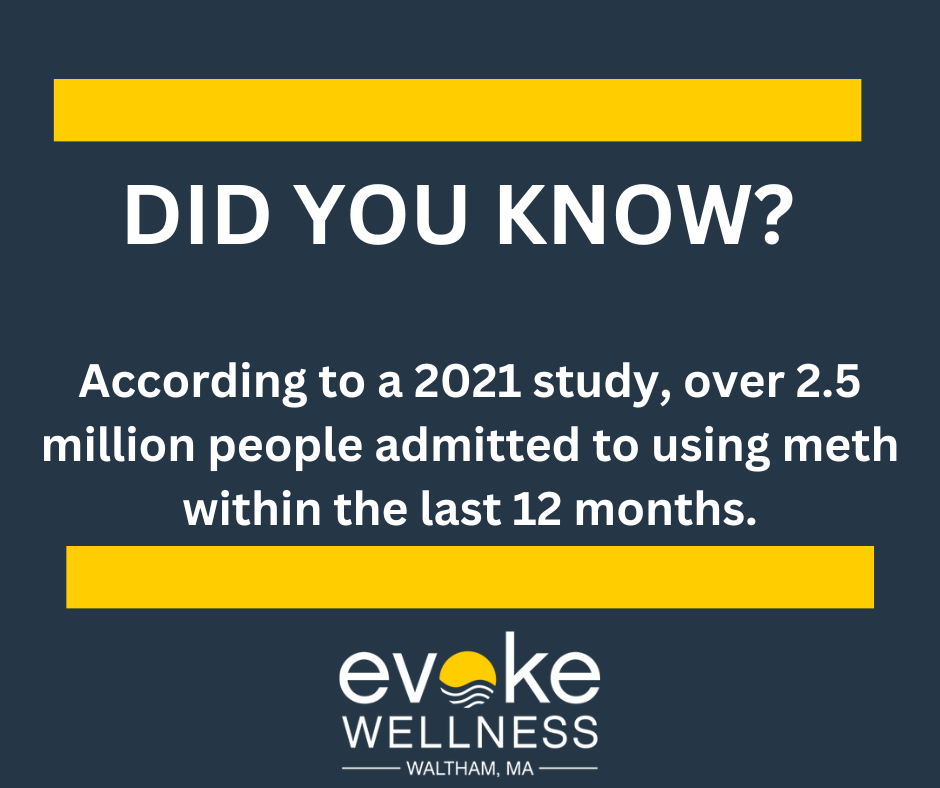As an individual struggling with methamphetamine addiction, you know the powerful hold this dangerous drug can have. But through understanding the side effects and dangers of meth, you can take the first steps toward recovery. Our center at Evoke Waltham provides insight into not only the effects of Methamphetamine use but also treatment programs and tools one can use on their path to recovery. Call us at (833)-287-7223 today or reach out online. By educating yourself, you can make informed choices to overcome methamphetamine addiction and regain control of your health and your life. In this article, we will discuss:
- What methamphetamine is
- The Effects of Methamphetamine Use
- The Dangers of Methamphetamine Abuse
- Methamphetamine Addiction Treatment Programs
- Cognitive-behavioral therapy
- Dialectical behavior therapy
- 12-step programs
- Maintaining Sobriety After Treatment
What Is Methamphetamine?
Methamphetamine, commonly referred to as meth, is a potent and highly addictive synthetic stimulant drug. This illegal substance affects the central nervous system, releasing high levels of dopamine and norepinephrine in the brain.
A Dangerous Stimulant
Meth comes in various forms – crystalline powder, pills, or shiny rock-like chunks. It can be smoked, snorted, injected, or taken orally. The intense rush and euphoric high from using meth are quickly followed by unpleasant side effects like:
- Anxiety and paranoia
- Increased body temperature and blood pressure
- Irregular heartbeat and cardiovascular problems
Highly Addictive Nature
Methamphetamine is considered one of the most addictive drugs. Its powerful effects on the brain’s reward system create compulsive drug-seeking behavior and use, despite harmful consequences. Chronic abuse can lead to psychosis, severe dental problems, brain damage, and other devastating effects.
Meth withdrawal is extremely difficult, often requiring comprehensive addiction treatment programs to aid recovery. Effective therapies include cognitive-behavioral therapy (CBT), dialectical behavior therapy, acceptance and commitment therapy (ACT), alongside holistic addiction therapies.
The Rise of Meth Use in the United States
A Growing Epidemic
The past decade has witnessed a staggering surge in methamphetamine use across America. This highly addictive stimulant has devastated communities, eroding public health and straining legal systems. According to a 2021 study, over 2.5 million people admitted to using meth within the last 12 months.
Potent and Perilous
Meth’s ability to induce euphoria and increase energy makes it alluring to users. However, its effects are fleeting – followed by intense cravings, paranoia, and potential psychosis. Long-term abuse ravages the brain, causing cognitive impairment and psychosis.
Tackling the Crisis
Curbing this epidemic demands a multi-pronged approach. Comprehensive meth addiction treatment programs that integrate evidence-based therapies like cognitive-behavioral therapy (CBT) and holistic practices are crucial. Outpatient options like intensive day treatment and 12-step facilitation allow flexibility. Ultimately, education and prevention remain pivotal to stemming this pernicious public health crisis.
Short-Term Effects of Meth Use
The rush of euphoria from methamphetamine is quickly overshadowed by disturbing physical and psychological side effects. Even single-use can trigger:
Increased Wakefulness
- Meth overstimulates the central nervous system, preventing restful sleep.
- Users often go days without sleeping, leading to irritability and psychosis.
Hyperthermia and Convulsions
- Meth raises body temperature to dangerous levels, causing muscle breakdown.
- This can trigger convulsions, kidney failure, and fatal cardiovascular issues.
Erratic, Violent Behavior
- Meth releases a flood of dopamine, causing paranoia and unpredictable mood swings.
- Users frequently lash out in psychotic rages or experience severe anxiety.
While the high is fleeting, the toll on the mind and body can be devastating – even fatal with a single, excessive dose. Seeking comprehensive treatment at a reputable addiction recovery program is crucial for breaking meth’s grip.
Long-Term Health Risks of Meth Addiction
Prolonged methamphetamine abuse can wreak havoc on your physical and mental wellbeing. The drug’s potent stimulant effects put immense strain on your body and brain over time.
Cardiovascular Damage
Meth causes rapid heart rate, increased blood pressure, and irregular heart rhythms. This dramatically raises your risk of heart attacks, strokes, and cardiovascular disease.
Neurological Effects
Meth overstimulates the brain’s dopamine system, eventually damaging dopamine receptors. This can lead to cognitive impairments, psychosis, mood disorders, and Parkinson’s-like symptoms.
Dental Problems
The erosion of tooth enamel from meth’s acidic vapors, coupled with dry mouth and poor dental hygiene, results in severe tooth decay and gum disease – infamously known as “meth mouth.”
Malnutrition and Weight Loss
As meth suppresses appetite, many chronic users suffer from malnourishment and extreme weight loss, further weakening their bodies and immune systems.
The ravages of long-term meth abuse are overwhelming – underscoring the vital importance of comprehensive addiction treatment to reclaim your health and wellbeing.
Meth Addiction Treatment Options
Comprehensive Treatment Programs
While overcoming meth addiction is challenging, evidence-based treatment programs offer hope. Cognitive-behavioral therapy (CBT) helps modify destructive behaviors and thoughts.
Dialectical behavior therapy addresses emotional regulation issues. Acceptance and commitment therapy (ACT) promotes mindfulness and values-based living.
Holistic Approaches
Holistic addiction therapy programs provide resources like meditation, yoga, and nutrition counseling complement traditional treatment. These mind-body practices manage withdrawal symptoms and cravings. A well-rounded, holistic approach addresses addiction’s physical, mental, and spiritual aspects.
Night Treatment Programs
For those requiring a lower level of care, night treatments (Night Treatments) provide treatment without full-time residential living. Night Treatments balance therapy with work, school, or family obligations. Day treatment options are also available for more intensive outpatient care.
12-Step Programs
The 12-steps addiction treatment programs, as used in Narcotics Anonymous, offer a spiritual framework for addiction recovery. Group meetings, sponsors, and a supportive community help maintain sobriety long-term. 12-step programs are often combined with professional addiction treatment.
Frequently Asked Questions About Meth Addiction and Treatment
What is Meth Addiction Treatment?
Treating methamphetamine addiction typically involves a comprehensive approach combining:
- Meth addiction treatment program with medical detox
- Counseling like cognitive-behavioral therapy (CBT)
- Holistic therapies like mindfulness and art therapy
- Family education and support groups
- Medication for co-occurring mental health issues
What are Night Treatment Programs?
Intensive outpatient programs (Night Treatments) provide scheduled treatment several times per week. Night Treatments allow for:
- Continued therapy and support after residential rehab
- Access to counseling while living at home
- Flexibility to keep working or attending school
Are 12-Step Programs Effective?
12-step programs based on the principles of Alcoholics Anonymous have proven benefits, including:
- Peer support from others in recovery
- Accountability through steps and sponsors
- Spiritual focus on accepting powerlessness
- Low cost and widespread availability
Conclusion
You now have a comprehensive understanding of the dangers of methamphetamine use and addiction. By learning about the severe physical, psychological, and social consequences, you can make informed choices to protect your health and wellbeing. With this knowledge, you can also support loved ones struggling with meth addiction by guiding them toward evidence-based treatments like cognitive-behavioral therapy, holistic therapies, 12-step programs, and intensive outpatient care. Although overcoming an addiction is challenging, recovery is possible through dedication and accessing professional help. You now have the resources to make positive changes, whether for yourself or others affected by this destructive substance. There is hope for a healthier future.
Begin Your Journey with Evoke Wellness at Waltham
If you or a loved one is considering outpatient treatment, Evoke Wellness at Waltham invites you to contact us. Our compassionate team is ready to answer your questions, discuss your needs, and help you take the first steps toward recovery. At Evoke Wellness, you will find more than just a treatment program – you’ll discover a community dedicated to your wellness and success. Together, let’s embrace the journey to recovery and the promise of a new beginning. Call us at (833)-287-7223 today or reach out online.



